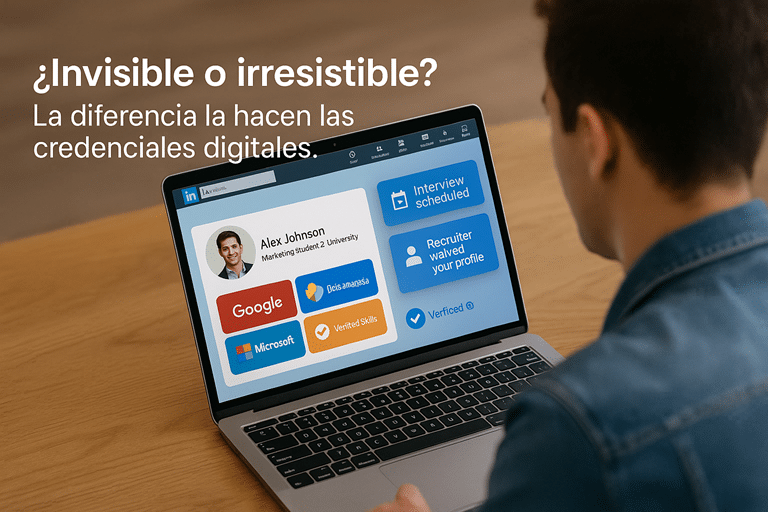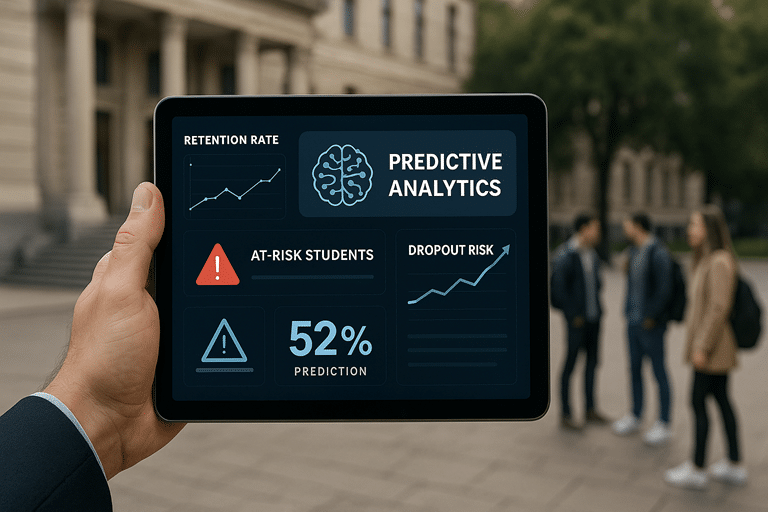The world of work is evolving rapidly, and emerging technologies are transforming the way professionals demonstrate their skills. In this context, verifiable credentials and AI are emerging as a powerful combination that could mark the end of the traditional curriculum. But how do these two elements work together, and what are their advantages?
This article explores how these technologies are revolutionizing the way we accredit our skills and knowledge, creating a new paradigm in the validation of professional competencies.
What are Verifiable Credentials?
Verifiable Credentials represent a significant evolution in the way we certify and validate competencies. Unlike traditional paper certificates, these credentials are digital documents that contain verifiable information about an individual’s achievements, skills, and qualifications.
But what really makes them special? First, their immutability. Thanks to technologies like blockchain, these credentials cannot be altered once issued. Furthermore, they are instantly verifiable by any entity or person who requests them, without the need for intermediaries.
For example, when a university issues a degree as a verifiable credential, it is registered on a secure network. An employer can then verify the authenticity of the degree in a matter of seconds, thus eliminating any possibility of forgery.
This system not only provides greater security but also greatly streamlines verification processes, which traditionally took days or even weeks. Additionally, verifiable credentials allow users complete control, allowing them to decide with whom they share their information and in what context.

How do verifiable credentials and AI work together?
The integration of verifiable credentials and artificial intelligence is creating a revolutionary ecosystem in the professional world. On the one hand, credentials provide verified and reliable data; on the other, AI provides the intelligent analysis and processing of this data.
This powerful combination is transforming various aspects of the world of work:
Candidate Evaluation:
AI systems can analyze verifiable credentials to find ideal candidates for a position, evaluating not only their academic qualifications but also specific skills, experience, and certifications. This significantly reduces selection time and improves the accuracy of the process.
Custom recommendations:
Based on a professional’s verifiable credentials, AI algorithms can suggest courses, certifications, or job positions that perfectly align with their profile. This personalized professional development is extremely valuable in a constantly evolving job market.
Skills gap detection:
By analyzing verifiable credentials on a large scale, AI can identify existing skills gaps across different sectors. This information is crucial for both educational institutions and professionals seeking to stay relevant.
Continuous validation:
Beyond the initial verification, AI systems can monitor the validity and relevance of credentials in real time, ensuring that accredited competencies remain valid in a changing professional environment.
An illustrative case is that of platforms that use AI to analyze the verifiable credentials of thousands of professionals and, based on this data, predict the skills that will be most in-demand in the coming years. This information allows professionals to anticipate market needs and acquire the right skills.
Advantages of verifiable credentials and AI
The adoption of AI-powered verifiable credentials offers numerous benefits for all stakeholders in the professional ecosystem:
Professionals
- Global portability: Verifiable credentials are internationally recognized, facilitating labor mobility between countries and organizations.
- Protection against counterfeiting: Because these credentials are immutable, they protect legitimate professionals from unfair competition from those who falsify their credentials.
- Dynamic professional profile: Unlike a static resume, verifiable credentials allow you to create a constantly updated professional profile that accurately reflects evolving skills.
- Control over data: Professionals retain sovereignty over their credentials, deciding who can access them and for how long.
Organizations
- Cost and time reduction: Automatic credential verification eliminates costly and error-prone manual processes.
- Greater confidence in hiring: Companies can be confident that candidates actually possess the skills they claim to possess.
- Data-driven decision making: AI provides advanced analytics on credentials, enabling more objective and accurate hiring decisions.
- Market adaptability: Organizations can quickly identify new skills needed and adapt their hiring requirements.
Educational institutions
- Greater value of your certifications: Institutions that issue verifiable credentials offer added value to their students.
- Feedback in real time: AI can provide insights into the relevance and impact of your programs on the labor market.
- Educational Personalization: With verifiable data on the impact of different programs, institutions can optimize and personalize their educational offerings.
A concrete example is seen in companies that have reduced their hiring time by more than 60% thanks to the implementation of AI systems that analyze verifiable credentials. This not only represents significant financial savings but also improves the experience for both candidates and HR teams.
The future of the curriculum: evolution, not extinction
As verifiable credentials and AI gain traction, we shouldn’t necessarily talk about the end of the traditional resume, but rather its evolution into a more dynamic, verifiable, and relevant form.
In this new paradigm, the resume becomes a living ecosystem of verifiable credentials, constantly updated and enriched with new skills. Professionals will no longer rely on a static document, but will instead have a digital profile that accurately reflects their career path and potential.
The platforms that facilitate this transformation are playing a fundamental role by providing the necessary infrastructure for the issuance, management, and verification of blockchain-based digital credentials. These solutions not only provide security and trust, but also create new opportunities for innovation in talent management.
Without a doubt, we are facing a revolution in the way we accredit and validate skills. Those professionals and institutions that know how to adapt to this change will be better positioned to thrive in an increasingly dynamic and competitive labor market. Therefore, the question is no longer whether verifiable credentials and AI will transform the traditional resume, but when and how they will do so in each sector and region.
Would you like to implement verifiable credentials in your institution?
If you want more information on how to implement verifiable credentials in your institution and take advantage of all the benefits we have explained, write to us directly at WhatsAppOur team of experts will be happy to advise you and show you how Acreditta can transform the way your organization issues and manages Digital Credentials.
Subscribe to blog here and receive all our content







